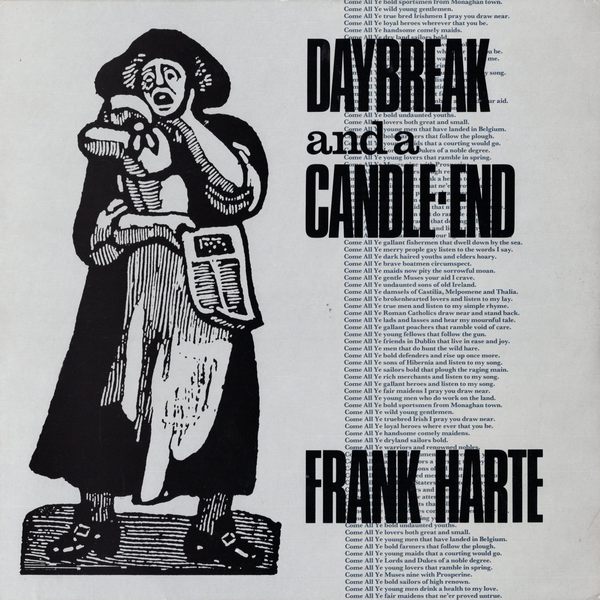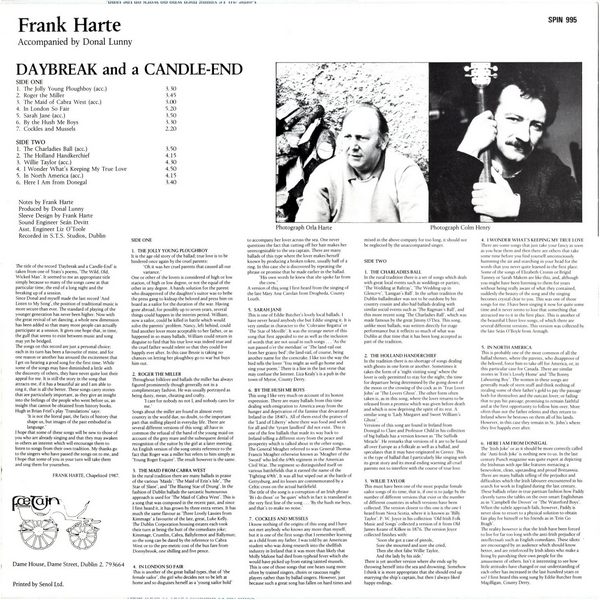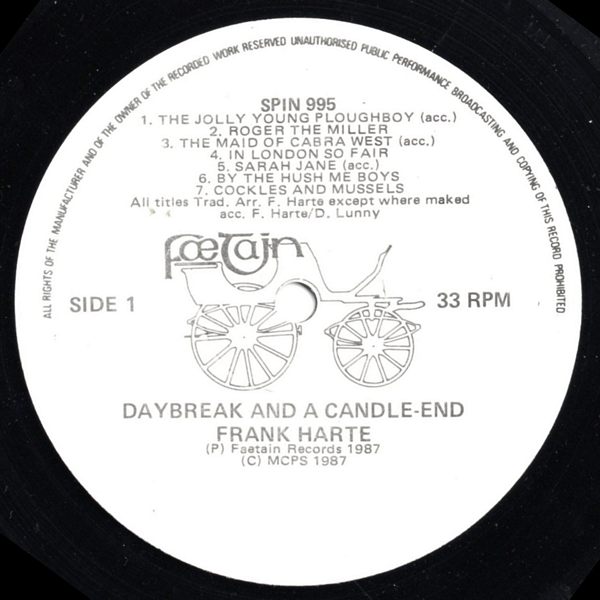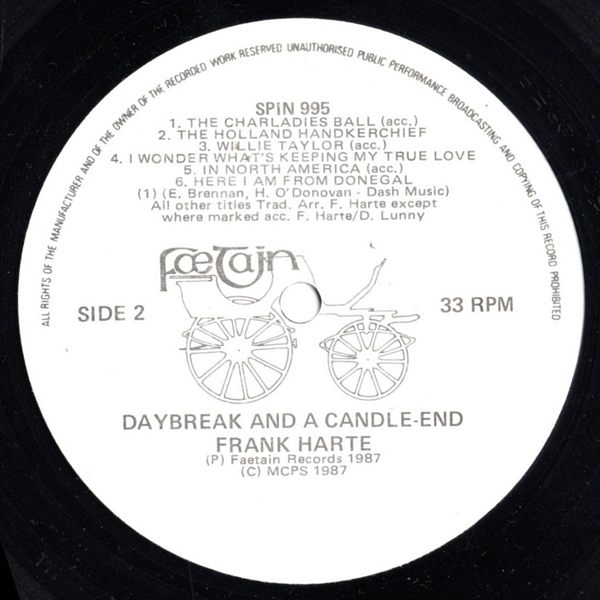
 |


 |
Sleeve Notes
The title of the record 'Daybreak and a Candle-End' is taken from one of Yeats's poems, 'The Wild, Old, Wicked Man', It seemed to me an appropriate title simply because so many of the songs came at that particular time, the end of a long night and the breaking up of a session.
Since Dónal and myself made the last record 'And Listen to My Song', the position of traditional music is more secure than ever. The standard of playing of the younger generation has never been higher. Now with the great revival of set dancing, a whole new dimension has been added so that many more people can actually participate at a session. It gives one hope that, in time, the gulf that seems to exist between music and song may yet be bridged.
The songs on this record are just a personal choice; each in its turn has been a favourite of mine, and for one reason or another has aroused the excitement that I get on hearing a good song for the first time. While some of the songs may have diminished a little with the discovery of others, they have never quite lost their appeal for me. It is still the story in the song that attracts me, if it has a beautiful air and I am able to sing it, that is all the better. These songs carry stories that are particularly important, as they give an insight into the feelings of the people who went before us, an insight that cannot be obtained from history books. Hugh in Brian Friel's play Translations' says:
'It is not the literal past, the facts of history that shape us, but images of the past embodied in language.'
I hope that some of these songs will be new to those of you who are already singing and that they may awaken in others an interest which will encourage them to listen to songs from their own tradition. My thanks go to the singers who have passed the songs on to me, and I hope that some of you in your turn will take them and sing them for yourselves.
FRANK HARTE,
Chapelizod 1987.
THE JOLLY YOUNG PLOUGHBOY — It is the age old story of the ballad; true love is to be hindered once again by the cruel parents:
'Oh it was her cruel parents that caused all our variance.'
One or other of the lovers is considered of high or low station, of high or low degree, or not the equal of the other in any degree. A handy solution for the parent who disapproved of the daughter's suitor was to bribe the press gang to kidnap the beloved and press him on board as a sailor for the duration of the war. Having gone abroad, for possibly up to seven years, several things could happen in the interim period. William, now a sailor, could be killed in battle which would solve the parents' problem. Nancy, left behind, could find another lover more acceptable to her father, or as happened in so many ballads, William could return in disguise to find that his true love was indeed true and the cruel father would relent so that they could live happily ever after. In this case Bessie is taking no chances on letting her ploughboy go to war but buys him out.
ROGER THE MILLER — Throughout folklore and ballads the miller has always figured prominently though generally not in a complimentary fashion. He was usually portrayed as being dusty, mean, cheating and crafty.
'I care for nobody no not I, and nobody cares for me.'
Songs about the miller are found in almost every country in the world due, no doubt, to the important part that milling played in everyday life. There are several different versions of this song; all have in common the refusal of the hand of the young maid on account of the grey mare and the subsequent denial of recognition of the suitor by the girl at a later meeting. An English version of the song omits reference to the fact that Roger was a miller but refers to him simply as 'Young Roger Esquire'. The result however is the same.
THE MAID FROM CABRA WEST — In the rural tradition there are many ballads in praise of the various 'Maids': 'The Maid of Erin's Isle', 'The Star of Slane', and The Blazing Star of Doing'. In the fashion of Dublin ballads the sarcastic humourous approach is used for 'The Maid of Cabra West'. This is a song that was composed in the recent past, and since I first heard it, it has grown by three extra verses. It has much the same flavour as 'Three Lovely Lassies from Kimmage' a favourite of the late, great, Luke Kelly. The Dublin Corporation housing estates each took their turn at being the butt of the comedians joke; Kimmage, Crumlin, Cabra, Ballyfermot and Ballymun; so the song can be dated by the reference to Cabra West or to the pre-metric cost of the bus fare from Donnybrook, one shilling and five pence.
IN LONDON SO FAIR — This is another of the great ballad types, that of 'the female sailor', the girl who decides not to be left at home and so disguises herself as a 'young sailor bold' to accompany her lover across the sea. One never questions the fact that cutting off her hair makes her unrecognisable to the sea captain. There are many ballads of this type where the lover makes herself known by producing a broken token, usually half of a ring. In this case she is discovered by repeating the phrase or promise that he made earlier in the ballad.
'His own words he knew that she spoke far from the crew.'
A version of this song I first heard from the singing of the late Mary Ann Carolan from Drogheda, County Louth.
SARAH JANE — This is one of Eddie Butcher's lovely local ballads. I have never heard anybody else but Eddie singing it. It is very similar in character to the 'Coleraine Regatta' or 'The Star of Moville'. It was the strange meter of this song that first appealed to me as well as the inclusion of words that are not usual in such songs ... 'As the sun passed o'er the meridian' or 'The land-rail out from her grassy bed'; the land-rail, of course, being another name for the corncrake. I like too the way the bird tells the lover 'You might as well go home and sing your poem.' There is a line in the last verse that may confuse the listener. Liza Kealy's is a pub in the town of Myroe, County Derry.
BY THE HUSH ME BOYS — This song I like very much on account of its honest expression. There are many ballads from this time dealing with emigration to America away from the hunger and deprivation of the famine that devastated Ireland in the 1840's. All of them extol the praises of the 'Land of Liberty' where there was food and work for all and the 'tyrant landlord' did not exist. This is one of the few ballads that made its way back to Ireland telling a different story from the peace and prosperity which is talked about in the other songs. The General Meagher referred to was General Thomas Francis Meagher otherwise known as 'Meagher of the Sword' who led the 69th regiment in the American Civil War. The regiment so distinguished itself on various battlefields that it earned the name of the 'Fighting 69th'. It was all but wiped out at the battle of Gettysburg, and its losses are commemorated by a Celtic cross on the actual battlefield.
The title of the song is a corruption of an Irish phrase 'Bi i do thost' or 'be quiet' which in fact is translated in the very first line of the song ... 'By the hush me boys, and that's to make no noise.'
COCKLES AND MUSSELS — I know nothing of the origins of this song and I have not met anybody who knows any more than myself, but it is one of the first songs that I remember learning as a child from my father. I was told by an American student who was doing research into the shellfish industry in Ireland that it was more than likely that Molly Malone had died from typhoid fever which she would have picked up from eating tainted mussels. This is one of those songs that one hears sung more often by trained singers, choirs or raucous rugby players rather than by ballad singers. However, just because such a great song has fallen on hard times and mixed in the above company for too long, it should not be neglected by the unaccompanied singer.
THE CHARLADIES BALL — In the rural tradition there is a set of songs which deals with great local events such as weddings or parties; 'The Wedding at Baltray', 'The Wedding up in Glencree', 'Lanigan's Ball'. In the urban tradition the Dublin balladmaker was not to be outdone by his country cousin and also had ballads dealing with similar social events such as 'The Ragman's Ball', and this more recent song 'The Charladies Ball', which was made famous by the great Jimmy O'Dea. This song, unlike most ballads, was written directly for stage performance but it reflects so much of what was Dublin at that time that it has been long accepted as part of the tradition.
THE HOLLAND HANDERCHIEF — In the tradition there is no shortage of songs dealing with ghosts in one form or another. Sometimes it takes the form of a 'night visiting song' where the lover is only permitted to stay for the night; the time for departure being determined by the going down of the moon or the crowing of the cock as in 'True Lover John' or 'The Lovers Ghost'. The other form often taken is, as in this song, where the lover returns to be released from a promise which was given before death and which is now depriving the spirit of its rest. A similar song is 'Lady Margaret and Sweet William's Ghost'.
Versions of this song are found in Ireland from Donegal to Clare and Professor Child in his collection of big ballads has a version known as 'The Suffolk Miracle'. He remarks that versions of it are to be found all over Europe as a folktale as well as a ballad, and speculates that it may have originated in Greece. This is the type of ballad that I particularly like singing with its great story and its moral ending warning all cruel parents not to interfere with the course of true love.
WILLIE TAYLOR — This must have been one of the most popular female sailor songs of its time, that is, if one is to judge by the number of different versions that exist or the number of different countries in which versions have been collected. The version closest to this one is the one I heard from Nova Scotia, where it is known as 'Billy Taylor'. P. W.Joyce in his collection 'Old Irish Folk Music and Songs' collected a version of it from Old James Keane of Kilkee in 1876. The version Joyce collected finishes with:
'Soon she got a case of pistols,
Sore she mourned and sore she cried,
Then she shot false Willie Taylor,
And the lady by his side.'
There is yet another version where she ends up by throwing herself into the sea and drowning. Somehow I think it is more appropriate that she should end up marrying the ship's captain, but then I always liked happy endings.
I WONDER WHAT'S KEEPING MY TRUE LOVE — There are some songs that just take your fancy as soon as you hear them and then there are others that take some time before you find yourself unconsciously humming the air and searching in your head for the words that you never quite learned in the first place. Some of the songs of Elizabeth Cronin or Brigid Tunney or Sarah Makem are like this, and, although you might have been listening to them for years without being really aware of what they contained, suddenly the beauty of the song and the singing becomes crystal clear to you. This was one of those songs for me. I have been singing it now for quite some time and it never seems to lose that something that attracted me to it in the first place. This is another of the beautiful Ulster love songs, of which there are several different versions. This version was collected by the late Seán O'Boyle from Armagh.
IN NORTH AMERICA — This is probably one of the most common of all the ballad themes, where the parents, who disapprove of the beloved, force him to take off for America, or, in this particular case for Canada. There are similar stories in 'Erin's Lovely Home' and 'The Bonny Labouring Boy'. The women in these songs are generally made of stern stuff and think nothing of stealing some of their father's gold to pay the passage both for themselves and the outcast lover; or failing that to pay his passage, promising to remain faithful and at the first opportunity to follow him over. More often than not the father relents and they return to Ireland where he bestows on them all of his lands. However, in this case they remain in St. John's where they live happily ever after.
HERE I AM FROM DONEGAL — The 'Irish Joke' or as it should be more correctly called the 'Anti-Irish Joke' is nothing new to us. In the last century Punch magazine was quite expert at depicting the Irishman with ape-like features menacing a benevolent, clean, upstanding and proud Brittannia. There are many ballads telling of the prejudice and difficulties which the Irish labourer encountered in his search for work in England during the last century. These ballads relate in true partisan fashion how Paddy cleverly turns the tables on the over-smart Englishman as in 'Campbell the Drover' or 'The Waterford Boys'. When the subtle approach fails, however, Paddy is never slow to resort to a physical solution to obtain fair play for himself or his friends as in 'Erin Go Bragh'.
The reality however is that the Irish have been forced to live for far too long with the anti-Irish prejudice of intellectuals such as English comedians. These idiots are encouraged by an audience which should know better, and are reinforced by Irish idiots who make a living by parodying their own people for the amusement of others. Isn't it interesting to see how little attitudes have changed or our understanding of each other has increased in the last hundred years or so? I first heard this song sung by Eddie Butcher from Magilligan, County Derry.